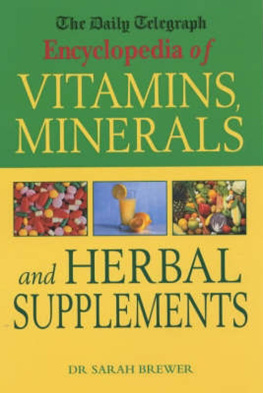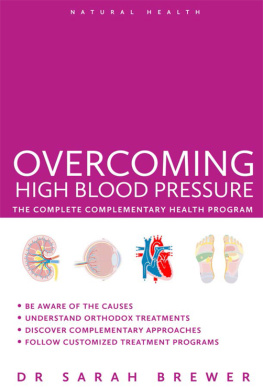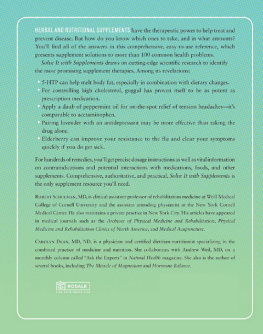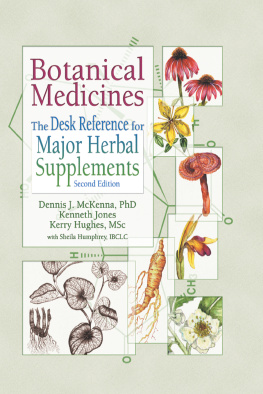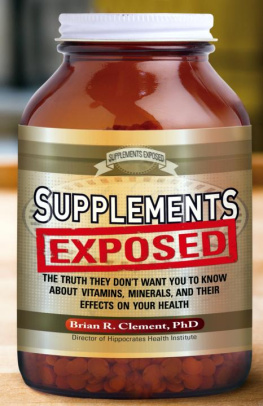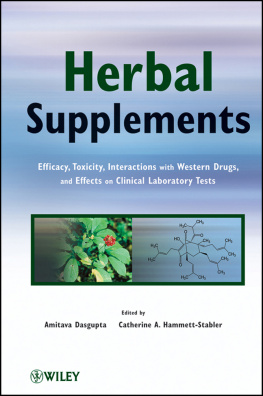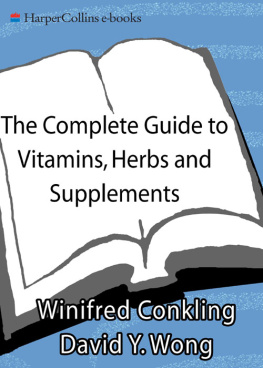
D R S ARAH B REWER is a recognized expert on sensiblesupplementation and was voted Health Journalist of theYear by the Health Food Manufacturers Association. She isa regular correspondent for The Daily Telegraph, Top Sant,Real Health & Beauty, Sugar, Lets Live and Slimming Worldand the author of over 20 popular health books. She iscurrently formulating her own consumer range ofsupplements, Trilogy.

Constable & Robinson Ltd.
3 The Lanchesters
162 Fulham Palace Road
London W6 9ER
www.constablerobinson.com
First published in the UK by Robinson
an imprint of Constable & Robinson Ltd 2002
Copyright Sarah Brewer 2002
The right of Sarah Brewer to be identified as the author of this work has been asserted by her in accordance with the Copyright, Designs and Patents Act, 1988
All rights reserved. This book is sold subject to the condition that it shall not, by way of trade or otherwise, be lent, resold, hired out or otherwise circulated without the publishers prior consent in any form of binding or cover other than that in which it is published and without a similar condition including this condition being imposed on the subsequent purchaser.
A copy of the British Cataloguing in Publication Data for this title is available from the British Library.
ISBN 1-84119-184-1
eISBN 978-1-47210-364-2
Edited and designed by Grapevine Publishing Services
Printed and bound in the EU
10 9 8 7 6 5 4 3
This book is dedicated to my wonderful family,
who willingly provided invaluable back-up
and support during those long hours of
research and writing
Acknowledgements
I would like to thank everyone who has been so helpful in providing research papers and information on the many invaluable nutritional supplements covered in this book.
How to use this book
The first part of this book looks at individual vitamins, minerals, herbs and other supplements. If you want to know more about a particular supplement, most of your questions should be answered here.
The second part of this book looks at a number of common health problems and tells you a little about them, their causes and symptoms plus the main treatments and supplements that are likely to help. Once you have looked up a condition, and selected a few possible remedies, you can then check these out in the first part of the book to choose those that are most likely to suit you.
Doses
The doses given in this book are only meant to be indicative of those in common use. Always follow the manufacturers instructions as doses will depend on the strength of individual products.
Pregnancy
Never take any supplements during pregnancy or breastfeeding, unless they are especially designed for use at this time (e.g. pregnancy vitamin and mineral blends) or have been recommended by a doctor or qualified medical herbalist.
IMPORTANT NOTES
This book is not intended to be a substitute for medical advice or treatment. Any person with a condition requiring medical attention should consult a qualified medical practitioner or suitable therapist.
All suggested doses are for adults only; specialist advice should be sought for supplementation in children.
Where not otherwise stated, supplements may be taken for an unlimited period, until symptoms improve.
Where no side effects are mentioned, no serious ones have been reported at standard doses.
Some herbal supplements may interact with prescribed drugs. Always check with a pharmacist or doctor before combining herbs with drugs.
Some herbal medicines may cause bleeding, heart problems or low blood sugar in patients undergoing surgery. Always tell your doctor what supplements you are taking as they may need to be stopped before an operation.
Introduction
An almost bewildering range of vitamin, mineral and herbal supplements is now available in chemists, supermarkets and healthfood shops. Unfortunately, legislation dictates that full information about the benefits of these supplements cannot be given on their packaging as this would constitute a health claim. As a result, people who would like to take supplements to improve a particular aspect of their health and well-being often find it difficult to select those supplements most likely to suit them.
This book aims to tell readers everything they need to know about the main vitamin, mineral and herbal supplements available, their benefits, research evidence to back their use, and any possible side effects, as well as an indication as to who should not take them.
Why take a vitamin and mineral supplement?
In an ideal world, we would get all the vitamins, minerals and essential fatty acids we need from our food. In reality, however, very few of us achieve this. Three quarters of women and almost nine out of ten men eat fewer than the recommended five servings of fruit and vegetables per day. In addition, over two thirds of people do not eat oily fish on a regular basis even though one or two portions per week are important for their essential fatty acid content. Similarly, over 90 per cent of people do not eat the recommended three servings of wholegrains a day.
Even when we do eat reasonable amounts of healthy foods, their nutritional content is depleted compared with how it was just a few decades ago. Apart from genetic manipulation aimed at producing fruit and vegetables especially for their colour, uniform size, and their capacity to look good for longer (at the expense of flavour and nutrients), intensive farming practices often mean that the soils in which crops are grown, and on which livestock are reared, are deficient in vital trace elements. The most startling example is selenium intakes have dropped significantly over the last 25 years, and in Britain have almost halved from 60mcg in 1974 to just 34 mcg per day in 1994. Intakes of essential fatty acids (EFAs found in nuts, seeds and fish) are also low with an estimated eight out of ten adults deficient in them. Deficiency of EFAs during pregnancy is now implicated in the development of dyslexia, attention deficit hyperactivity disorder and even schizophrenia in the resultant offspring.
What is a serving?
Aim to eat at least five, and preferably eight servings of fruit and vegetables per day.
A serving is basically the amount you are happy to eat in one sitting the more the better. Typically, this would amount to a glass of fruit juice, a generous helping of green or root vegetables (excluding potatoes), a large mixed salad, 1 large beef tomato or 2 medium tomatoes, a handful of grapes, cherries or berries, and a single item of apple, orange, kiwi, peach, pear, nectarine, or banana. A serving of larger items may amount to grapefruit, ogen melon, mango, papaya, while for smaller and dried fruits, it could amount to 24 dates, figs, satsumas, passion fruit, apricots, plums or prunes. The phrase to hang on to is at least ideally we would all benefit from eating 810 servings of fruit, vegetables or salads per day, but some people, especially those with digestive problems, may find this difficult. Plant-based foods are important sources of vitamins, minerals, antioxidants, fibre and non-nutrient substances known as phytochemicals that help to protect against a variety of common conditions, including coronary heart disease and cancer.
Taking an A to Z-style vitamin and mineral supplement providing around 100 per cent of the recommended daily amount (RDA) of as many vitamins and minerals as possible, plus an EFA supplement (e.g. evening primrose, flaxseed, hempseed or fish oils) acts as a nutritional safety net, and is becoming an increasingly wise investment for all adults. (
Next page
